|
JAIN VISHVA BHARATI LONDON
is pleased to inform you of the following programme
in the auspicious presence of respected

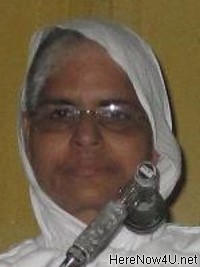
Samani Pratibha Pragya & Samani Sheel Pragya
Report
Dr. Manchanda talk on Health and Preksha Meditation hosted by Jain Vishwa Bharati London on 12-May-2013, London
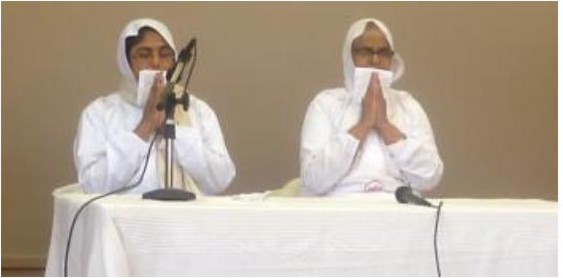
Respected Samani Pratibha Pragyaji and Samani Sheel Pragyaji commenced the event with the recitation of Navkar Mantra and Prayers.
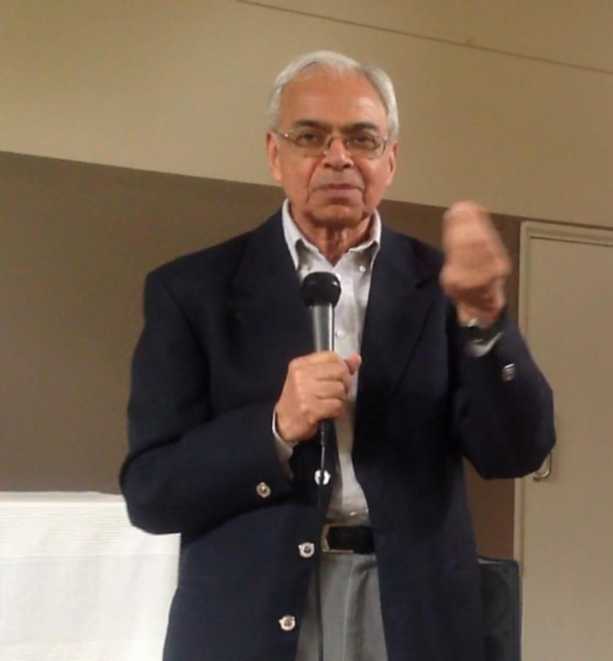 Dr. Manchanda mentioned that as a cardiologist he became interested in alternative systems for better health. He researched many Yoga practices and eventually decided that Preksha Meditation was the easiest and best method. His research was on Preksha Meditation for reversal of heart diseases. He found that Preksha Meditation is extremely powerful to the extent that patients with three blocked arteries could manifest reversal and avoid by-pass surgery. More than 80000 patients have been saved from heart surgeries through Preksha Meditation techniques. From next month onwards largest Indo-UK Meditation and Health project is going to commence with the participation of London School of Public Health, Imperial College and 16 Indian institutions research is going to commence. Swami Dharmanandji has devised a Preksha Meditation capsule which will be tried in patients with heart diseases. If results are positive then it will be the largest ever scientific research undertaken in this field.
Dr. Manchanda mentioned that as a cardiologist he became interested in alternative systems for better health. He researched many Yoga practices and eventually decided that Preksha Meditation was the easiest and best method. His research was on Preksha Meditation for reversal of heart diseases. He found that Preksha Meditation is extremely powerful to the extent that patients with three blocked arteries could manifest reversal and avoid by-pass surgery. More than 80000 patients have been saved from heart surgeries through Preksha Meditation techniques. From next month onwards largest Indo-UK Meditation and Health project is going to commence with the participation of London School of Public Health, Imperial College and 16 Indian institutions research is going to commence. Swami Dharmanandji has devised a Preksha Meditation capsule which will be tried in patients with heart diseases. If results are positive then it will be the largest ever scientific research undertaken in this field.
As per the World Health Organisation definition, health is not simply absence of disease or infirmary, but good physical, mental, social as well as spiritual wellbeing. Dr. Manchanda mentioned that whilst performing preventive check-ups many of his patients claimed to be perfectly health with ideal cholesterol levels, good treadmill tests, etc. However, Dr. Manchanda claims that many of them, in his view were unhealthy, as his psychologists claimed that these patients had tremendous pent up anger within them. Thus to be perfectly healthy one needs not only good physical health, but also good mental and spiritual health. Ironically, people today need to be aware of what is spirit in the first place!
There are lot of medical challenges ahead. In 1947 when India became independent, the average mortality rate was 32 years (not that people were not living to 80-90 years, but infant mortality was too high). Now the mortality rate has become greater than 65 years, but rapid urbanisation, industrialisation and globalization is making the lifestyle unhealthy. People are in a rush and caught up in a rat race. Huge epidemics of diseases are rapidly increasing.
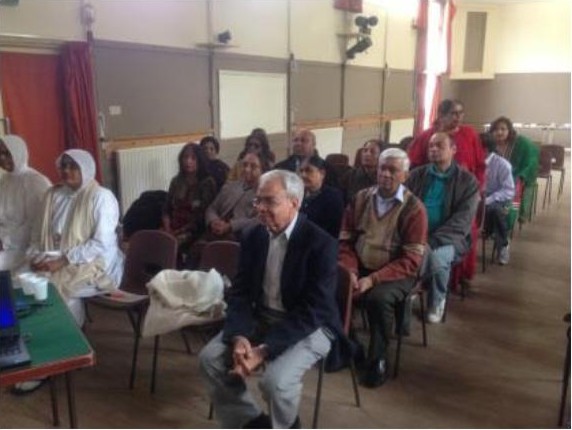 He believes that Indians living in the UK have the highest cardio vascular disease compared to any other immigrants. In India, cardio vascular disease kills 2.5 million people every year which is equivalent to 5 people dying every minute or a jumbo jet carrying 400 people crashing every 90 minutes. Diabetes: Indians have the highest rate of diabetes in the world. Cost of managing these diseases is very high. WHO estimated that Indian spend $230 billion in the last 10 years looking after diabetes, heart disease and stroke. In India it is estimated that 40 million people suffer from diabetes and its going to increase by 300% in 20 years. It is shown that too much intake of refined carbohyDr.ates are linked to diabetes. Sugar, white bread, refined & polished rice should not be consumed. He suggested that we should consume unrefined food such as brown rice. He further added that unrefined cold compressed oil is recommended e.g. mustard oil or rapeseed oil as they have the highest levels of Omega 3. Coconut oil is not preferred as it is very high in saturated fat. The criteria for cooking oil usage should be less than 10% saturated fat, high mono saturated fats and high levels of Omega 3. Although olive oil has some beneficial properties, it is 20 times inferior to rapeseed oil and it does not have Omega 3.
He believes that Indians living in the UK have the highest cardio vascular disease compared to any other immigrants. In India, cardio vascular disease kills 2.5 million people every year which is equivalent to 5 people dying every minute or a jumbo jet carrying 400 people crashing every 90 minutes. Diabetes: Indians have the highest rate of diabetes in the world. Cost of managing these diseases is very high. WHO estimated that Indian spend $230 billion in the last 10 years looking after diabetes, heart disease and stroke. In India it is estimated that 40 million people suffer from diabetes and its going to increase by 300% in 20 years. It is shown that too much intake of refined carbohyDr.ates are linked to diabetes. Sugar, white bread, refined & polished rice should not be consumed. He suggested that we should consume unrefined food such as brown rice. He further added that unrefined cold compressed oil is recommended e.g. mustard oil or rapeseed oil as they have the highest levels of Omega 3. Coconut oil is not preferred as it is very high in saturated fat. The criteria for cooking oil usage should be less than 10% saturated fat, high mono saturated fats and high levels of Omega 3. Although olive oil has some beneficial properties, it is 20 times inferior to rapeseed oil and it does not have Omega 3.
Diet has become very unhealthy fuelled by emergence of fast food chains who promote foods rich in fats. Trans fats is poison for the heart and as bad as smoking. Only 2 states in the US, California and New York have banned the use of trans fats. Repeated frying in the same oil makes food very high in trans fats which is very dangerous. 40% of cancer is related to diet we take. A good diet is considered to be one with low fat, whole grain, low salt & sugar, lots of fresh fruits and vegetables (at least 4/5 helpings) and even diabetic patients can take 3 helpings of fruits and vegetables because they are complex carbohydrates.. It is scientifically recommended to follow a vegetarian diet as red meat can cause several diseases and shorten life. Regular exercise (brisk walk for at least 30 mins daily) is advised and even those who work in offices can use stairs instead of elevators. One of the main reasons why people don't exercise is that they are slaves of their own minds. The goal of Preksha Meditation is to be master of one's own destiny and thus you becomes master of your mind. In Preksha Meditation, when one closes their eyes and is advised to watch their breath, who watches as the eyes are closed? It is the consciousness that watches which can be only realised and communication with self-starts. Aphorisms proclaimed by Acharya Tulsi and Acharya Mahapragya, "Know thyself through thyself" are very pertinent. It is believed that 80% of those who perform Preksha Meditation do exercise regularly. We should follow what our ancestors told us, "Simple Living, High Thinking" as opposed to today's age of Hurry, Worry and Curry. Dr. Manchanda advised that taking 1.5 tea spoons of fibre, such as Isabgol, twice a day, 15 minutes before lunch and dinner reduces cholesterol. It is no doubt beneficial for constipation but also for cholesterol reduction, prevention of cancer, weight reduction. It gives a sense of fullness and also is helpful for diabetics because it acts like a sponge, absorbing and excreting, but need to take lots of water with it. One should also consume nuts such as almonds and walnuts which are a high source of Vitamin E.
Obesity is a major problem. It is believed that in time to come, 50% of the people in the UK are going to be obese. Dr. Manchanda mentioned that once he was walking in the park and told a lady that why is his son sick. The lady surprisingly replied that her son is perfectly healthy and what makes him feel that son is sick. Dr. Manchanda replied that as her son looks overweight he is considered to be sick. In fact many people do not acknowledge obesity as sickness and on the contrary consider it as a sign of healthiness. Obesity leads to heart problems, diabetes, joint pains, etc.
Abdomen obesity is very common for Indians. Benchmark for abdomen obesity is waist size being greater than 36" for males and 32" for ladies. He believes that 80% of Indians have this central obesity problem. This is a high risk factor for diabetes and high blood pressure.
Too much salt leads to hyper tension. People are also having low fibre diet (not consuming enough fresh fruits and vegetables). Fibre is only found in vegetarian diet.
Many people are financially well off but almost all suffer from mental stress. Mental stress not only makes the person suffering from it unhappy, but family becomes unhappy, society becomes unhappy and the world is unhappy. Mental stress is one of the major culprits for causing heart disease. No method in Western medicine can control this mental stress problem. We do have psychologists and medicines, but these are not treatments. Therefore, Yoga and Preksha Meditation in particular leads to happy, stress free life as happiness is the ultimate aim of life (be it material or spiritual). Dr. Manchanda said we should pay heed to the sermons of our gurus and Respected Samanijis who repeatedly tell us that happiness is found internally within and not externally.
Psycho neurotic diseases are also very common with many suffering from anxiety and depression. All problems start from the mind. Everyone knows smoking is harmful, but yet smoking is prevalent. Mind says don't exercise although it is good.
Hypertension is the commonest disease in the world today. Every 3rd person in the world suffers from this. High Blood pressure is considered to be that which is greater than 140/90. Many people suffer from pre-hyper tension. WHO has called this year as the year of Hypertension. A decade ago it was called the "Silent Killer". It's a disease that does not cause any symptoms and most people are not aware. Dr. Manchanda therefore advised that everyone should be aware of their blood pressure. In India only 25% of the population are aware that they have high blood pressure. This disease leads to heart attacks, kidney problems and strokes.
Unhealthy life style is one whose diet has too much salt, lack of exercise, too much fried food and stress. Cholesterol deposits can start accumulating from as young as 8-10 years of age.
Where does Preksha Meditation fit in a healthy lifestyle? It is based on concentration of perception.
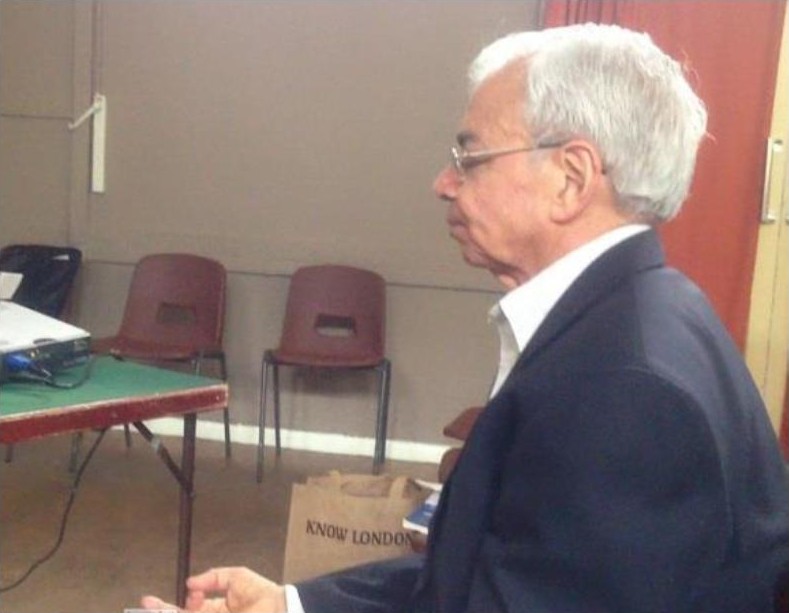 Through Kayotsarga one relaxes through autosuggestion. There is ample scientific data to illustrate that it lowers Blood Pressure. It is also known as Yoga Nidra and can assist insomniacs to sleep well. Pranayanam is essential as most people don't breathe well. He found that 99% of his patients don't breather properly. When we breathe in, abdomen should come out and when we breathe out, it should go in. This is abdominal breathing or diaphragm breathing. Vital capacity increases as air which goes in is 30% more. Asanas or health rejuvenating exercises can be performed by anyone at any age. This can be started from day 1. Even those who cannot sit on the floor can do simple head and neck exercises sitting on the chair. It can even be done lying down. Anupreksha or contemplation is unique to Preksha Meditation compared to many other yoga systems. Repeated positive affirmation and positive thoughts helps to get rid of negative emotions and is very effective to prevent progression of diseases. It can even aid to regress. Dr. Manchanda showed evidence from functional MRI scans that Preksha Meditation activates peace and tranquillity areas of the brain where peace and tranquillity and areas of brain associated with ego, jealousy become less. Bio-chemistry changes whereby bad chemicals get reduced, endorphins or happy hormones increase, nervous system changes for the better, heart rate reduces and physio-biological changes occur. There is scientific data available to illustrate the benefits of meditation: stress management, controlling anxiety and depression. Preksha Meditation is very effective and cannot be compared to drugs as they all have side effects. Studies have shown that any type of meditation, be it Transcendental or Vipasana, can reduce blood pressure by 4/5 ml. Even 2/3 ml reduction of the blood pressure can cut the risk of strokes by 50%. Many of Dr. Manchanda's patients with mild hyper tension stopped drugs and even those with severe hyper tension problems reduced their dosage after following Preksha Meditation. Studies by Dean Ornish in the USA has shown that even blockage in arteries can be reduced by meditational techniques. Any type of yoga or meditation can be practised as in the end the effect is the same ie tranquillity of the mind. One should never be under the impression that Preksha Meditation can clear the blockage completely. Not a single case in is 1000 angiogram patients did Dr. Manchanda observe arteries cleared. To achieve that, one needs to start Preksha Meditation at an early stage, the younger the better. Even small regression through Preksha Meditation can reduce the amount of angioplasty and by-pass surgeries significantly.
Through Kayotsarga one relaxes through autosuggestion. There is ample scientific data to illustrate that it lowers Blood Pressure. It is also known as Yoga Nidra and can assist insomniacs to sleep well. Pranayanam is essential as most people don't breathe well. He found that 99% of his patients don't breather properly. When we breathe in, abdomen should come out and when we breathe out, it should go in. This is abdominal breathing or diaphragm breathing. Vital capacity increases as air which goes in is 30% more. Asanas or health rejuvenating exercises can be performed by anyone at any age. This can be started from day 1. Even those who cannot sit on the floor can do simple head and neck exercises sitting on the chair. It can even be done lying down. Anupreksha or contemplation is unique to Preksha Meditation compared to many other yoga systems. Repeated positive affirmation and positive thoughts helps to get rid of negative emotions and is very effective to prevent progression of diseases. It can even aid to regress. Dr. Manchanda showed evidence from functional MRI scans that Preksha Meditation activates peace and tranquillity areas of the brain where peace and tranquillity and areas of brain associated with ego, jealousy become less. Bio-chemistry changes whereby bad chemicals get reduced, endorphins or happy hormones increase, nervous system changes for the better, heart rate reduces and physio-biological changes occur. There is scientific data available to illustrate the benefits of meditation: stress management, controlling anxiety and depression. Preksha Meditation is very effective and cannot be compared to drugs as they all have side effects. Studies have shown that any type of meditation, be it Transcendental or Vipasana, can reduce blood pressure by 4/5 ml. Even 2/3 ml reduction of the blood pressure can cut the risk of strokes by 50%. Many of Dr. Manchanda's patients with mild hyper tension stopped drugs and even those with severe hyper tension problems reduced their dosage after following Preksha Meditation. Studies by Dean Ornish in the USA has shown that even blockage in arteries can be reduced by meditational techniques. Any type of yoga or meditation can be practised as in the end the effect is the same ie tranquillity of the mind. One should never be under the impression that Preksha Meditation can clear the blockage completely. Not a single case in is 1000 angiogram patients did Dr. Manchanda observe arteries cleared. To achieve that, one needs to start Preksha Meditation at an early stage, the younger the better. Even small regression through Preksha Meditation can reduce the amount of angioplasty and by-pass surgeries significantly.
Those suffering from migraine can also benefit from Preksha Meditation as the root cause is anxiety. Every second person on this planet has anxiety. Meditation can also assist those with Irritable Bowel Syndrome. Meditation also assists those with severe addictions. Preksha Meditation is a type of life style. Even if those with diseases and aged 70/80 years can do Preksha Meditation, then everyone should be able to pursue it. Even if one person in the family starts, others observe and would soon follow.
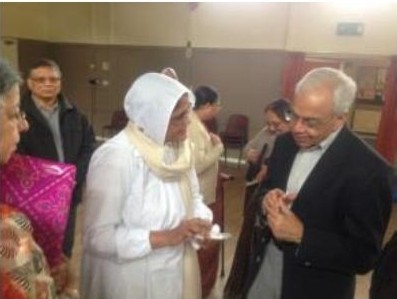 In 1994, Dr. Manchanda was privileged to have the blessings of Acharya Tulsi and Acharya Mahapragya to embark upon scientific research through spiritual techniques and show the truth to the world. He emphasised that everyone should take the benefits of Respected Samanijis for their physical and spiritual well-being. He strongly encourage that children should be gradually nurtured int practising Preksha Meditation. As an example, he said that Heritage School in Delhi has Preksha Meditation compulsory and the children are by and large well behaved with good manners and performing well in in studies.
In 1994, Dr. Manchanda was privileged to have the blessings of Acharya Tulsi and Acharya Mahapragya to embark upon scientific research through spiritual techniques and show the truth to the world. He emphasised that everyone should take the benefits of Respected Samanijis for their physical and spiritual well-being. He strongly encourage that children should be gradually nurtured int practising Preksha Meditation. As an example, he said that Heritage School in Delhi has Preksha Meditation compulsory and the children are by and large well behaved with good manners and performing well in in studies.
Samani Pratibha Pragyaji thanked Dr. Manchanda for sharing his views with the audience and she hoped that her own PhD studies on Preksha Meditation at School of Oriental and African Studies (SOAS, London) will be beneficial to the society.
